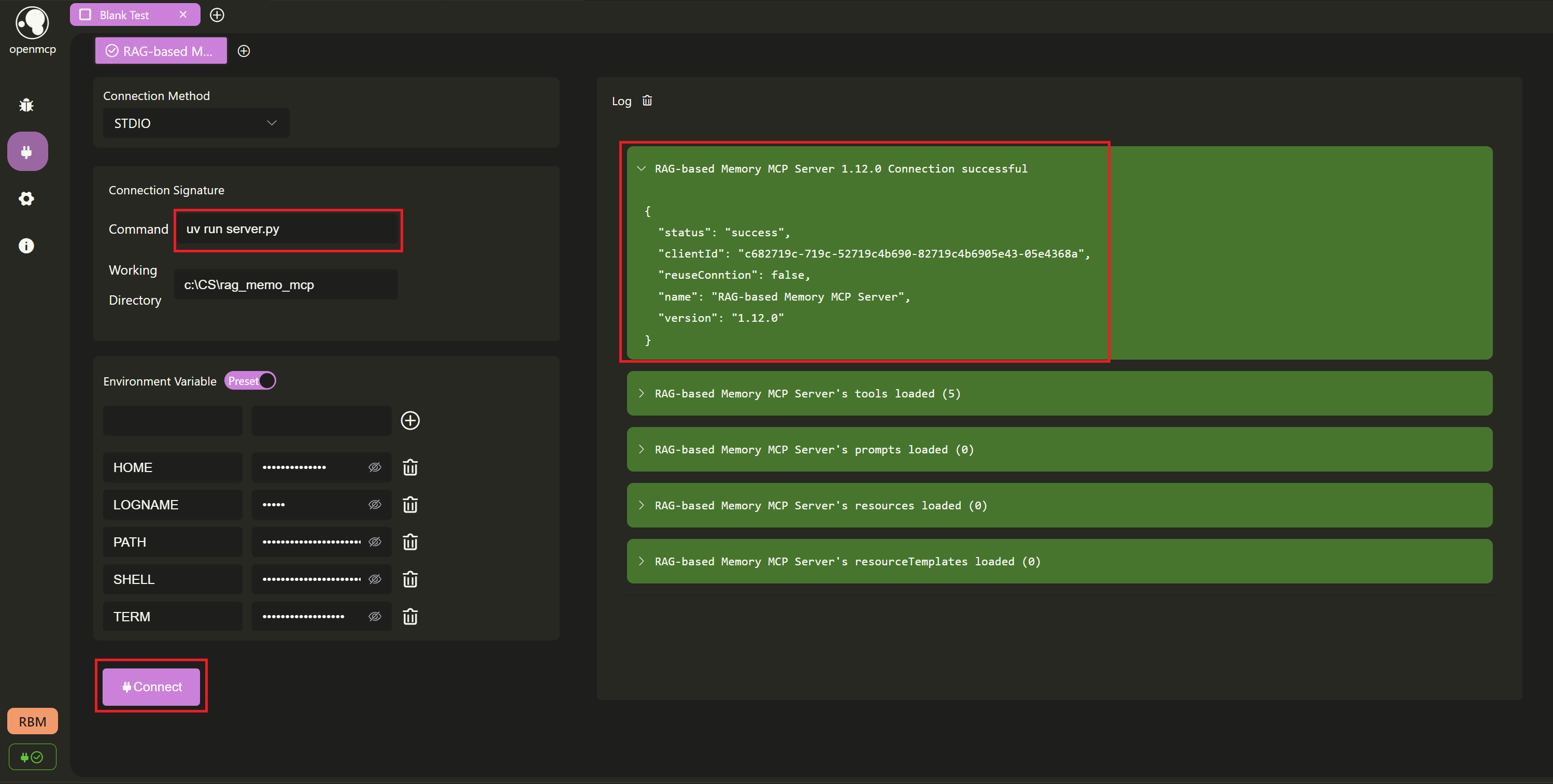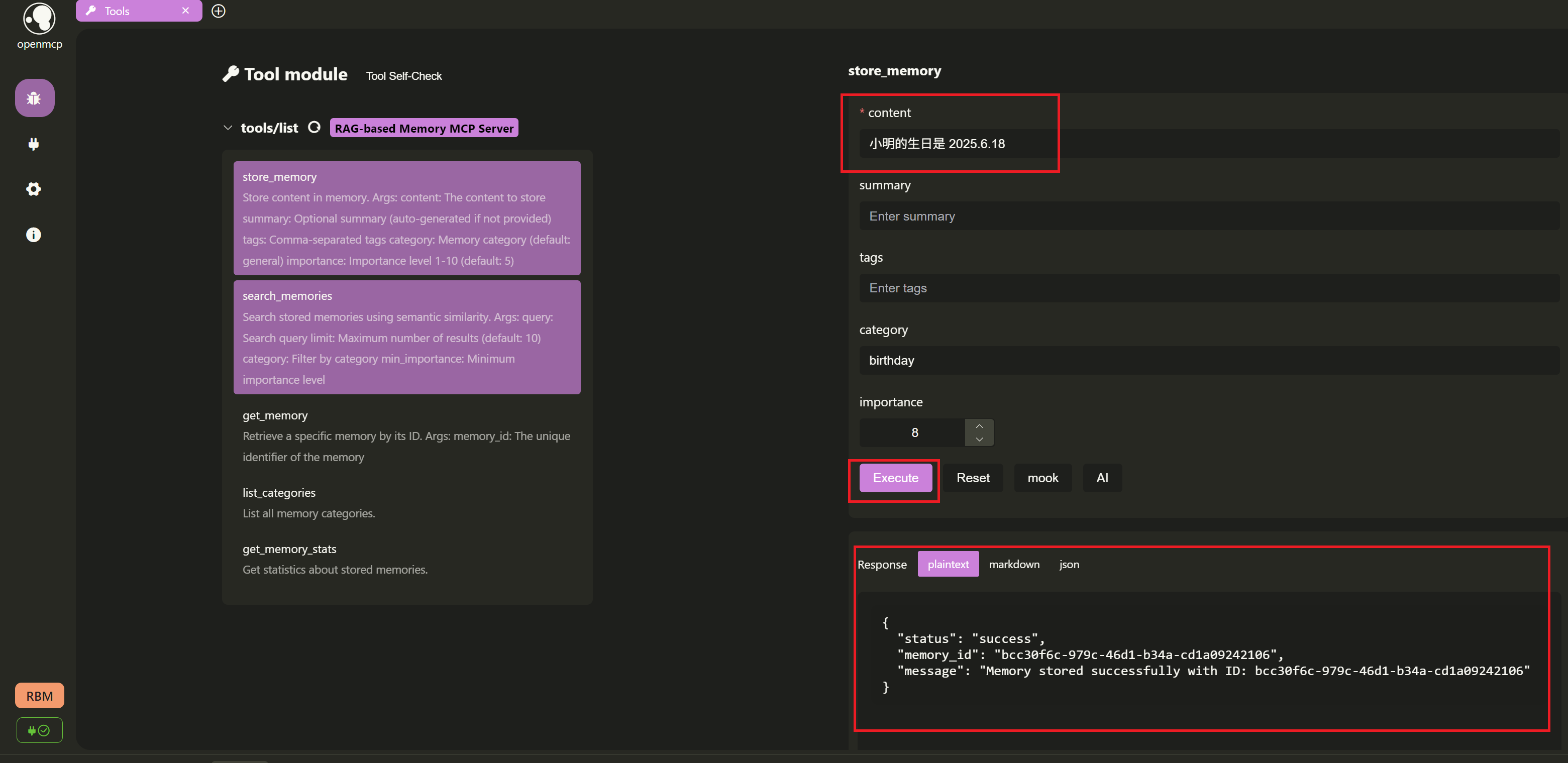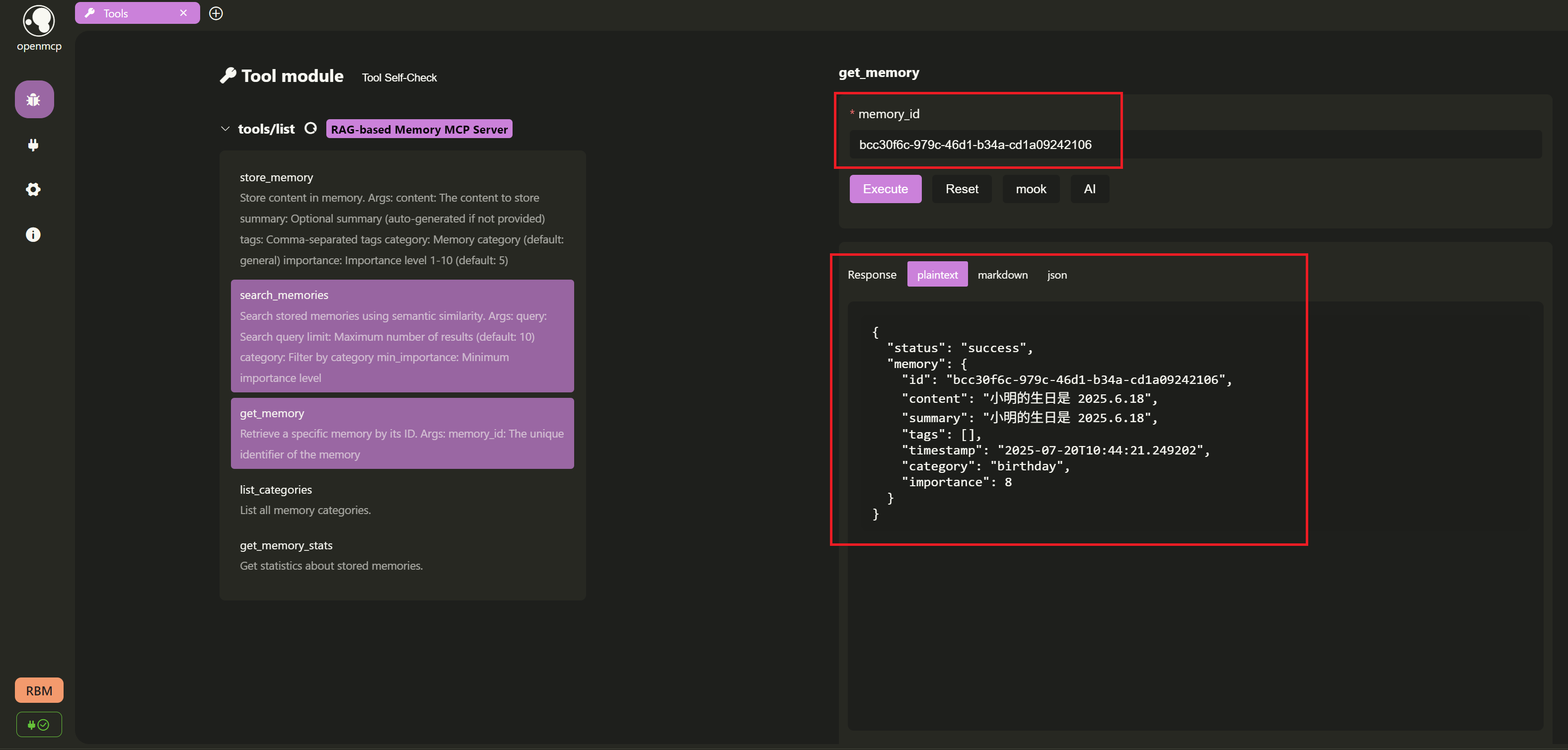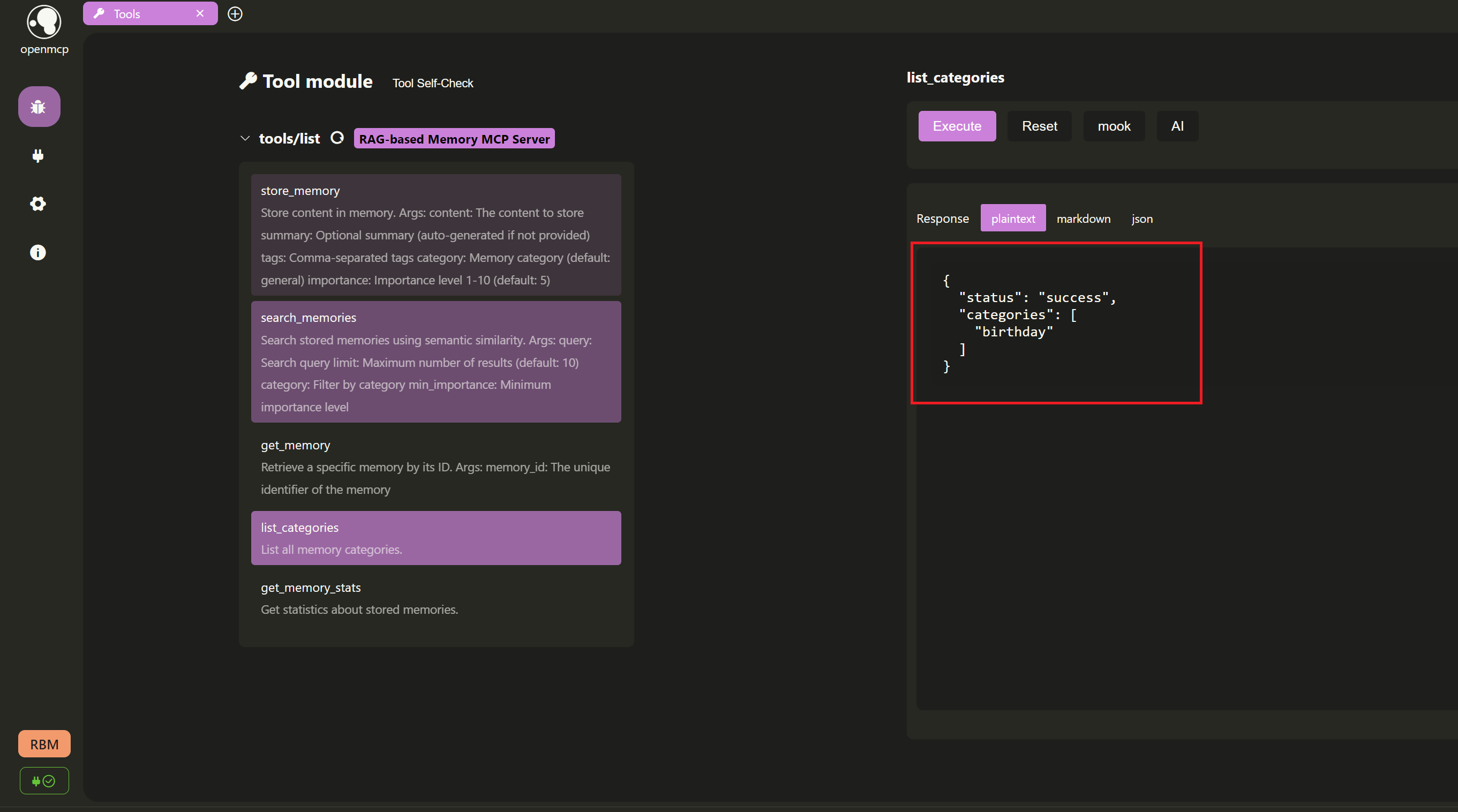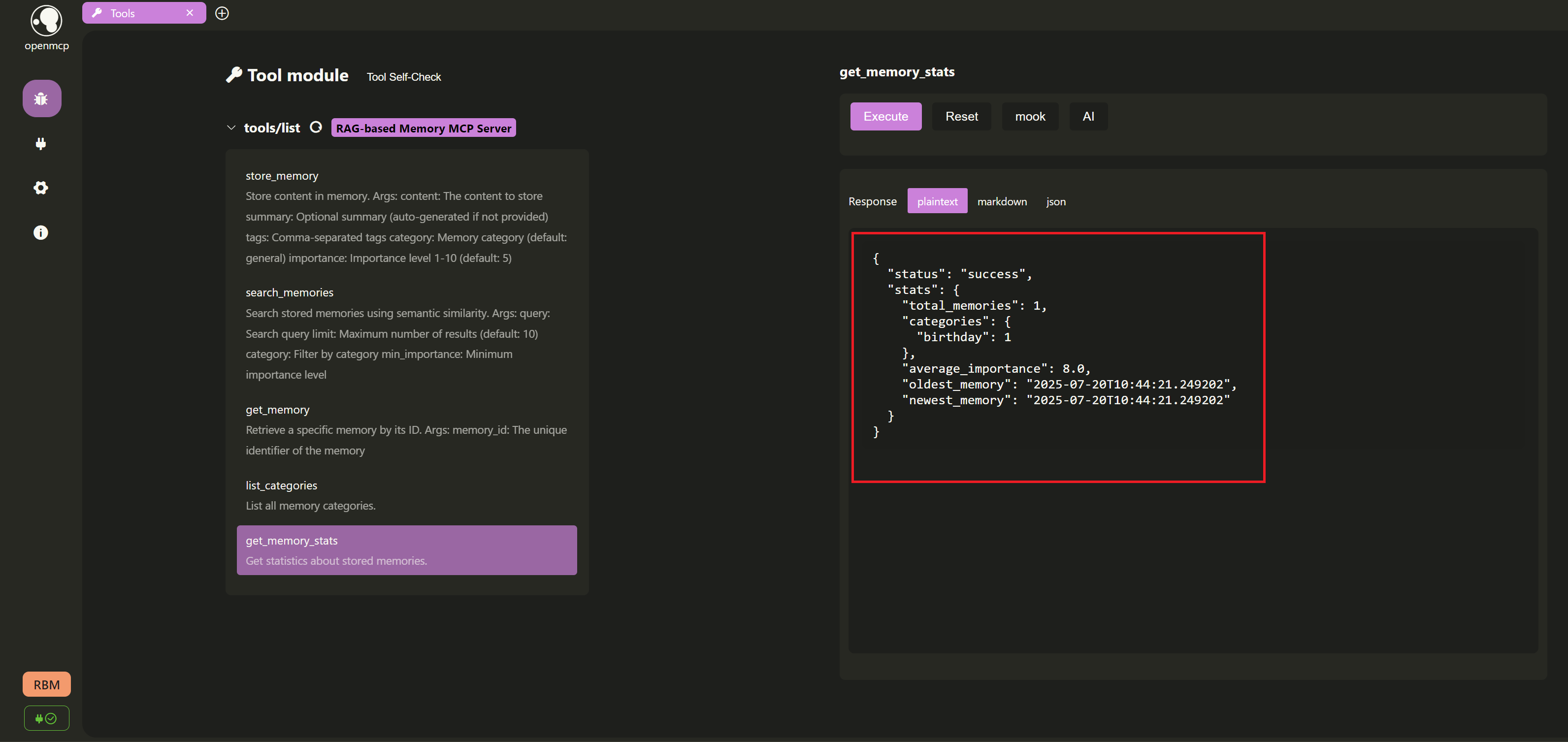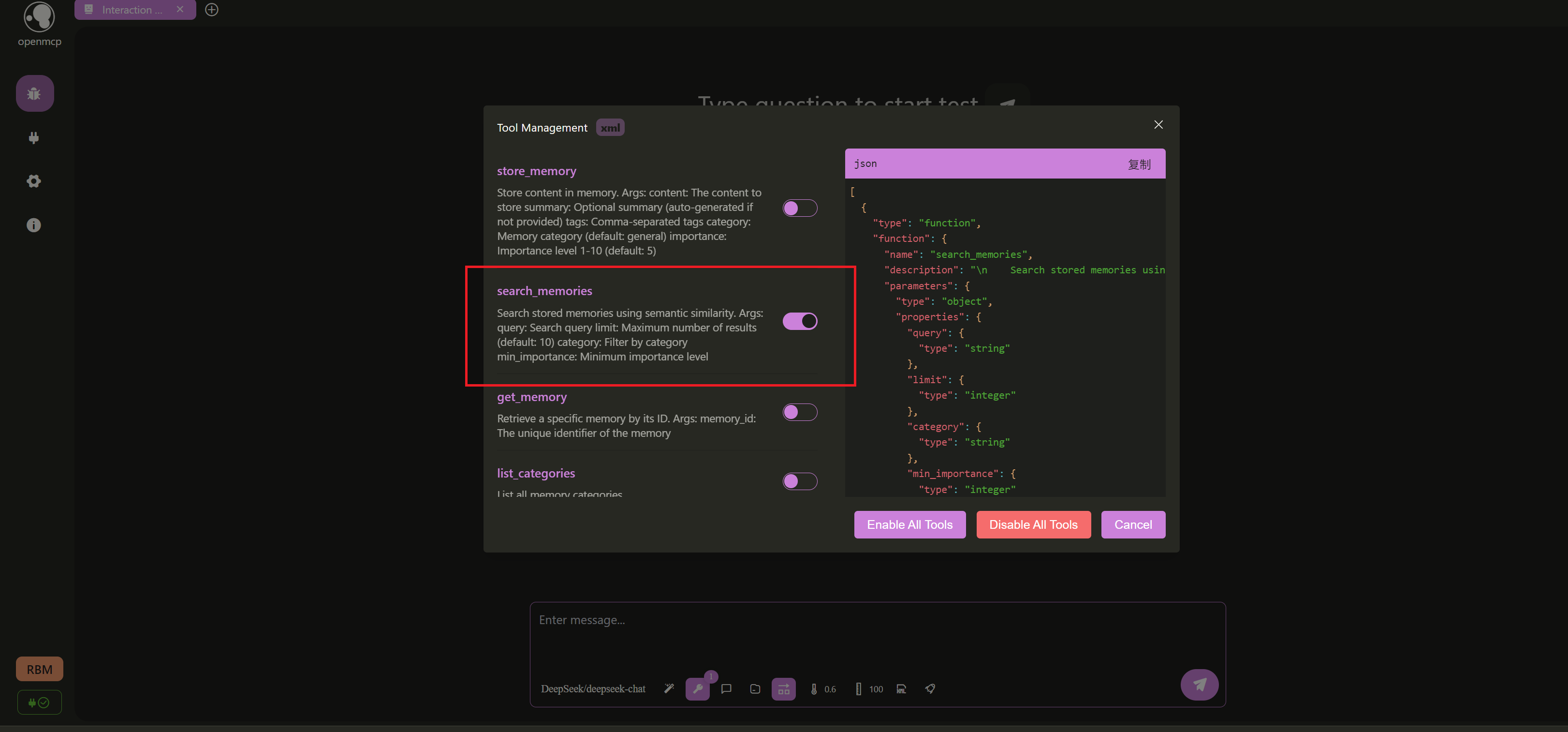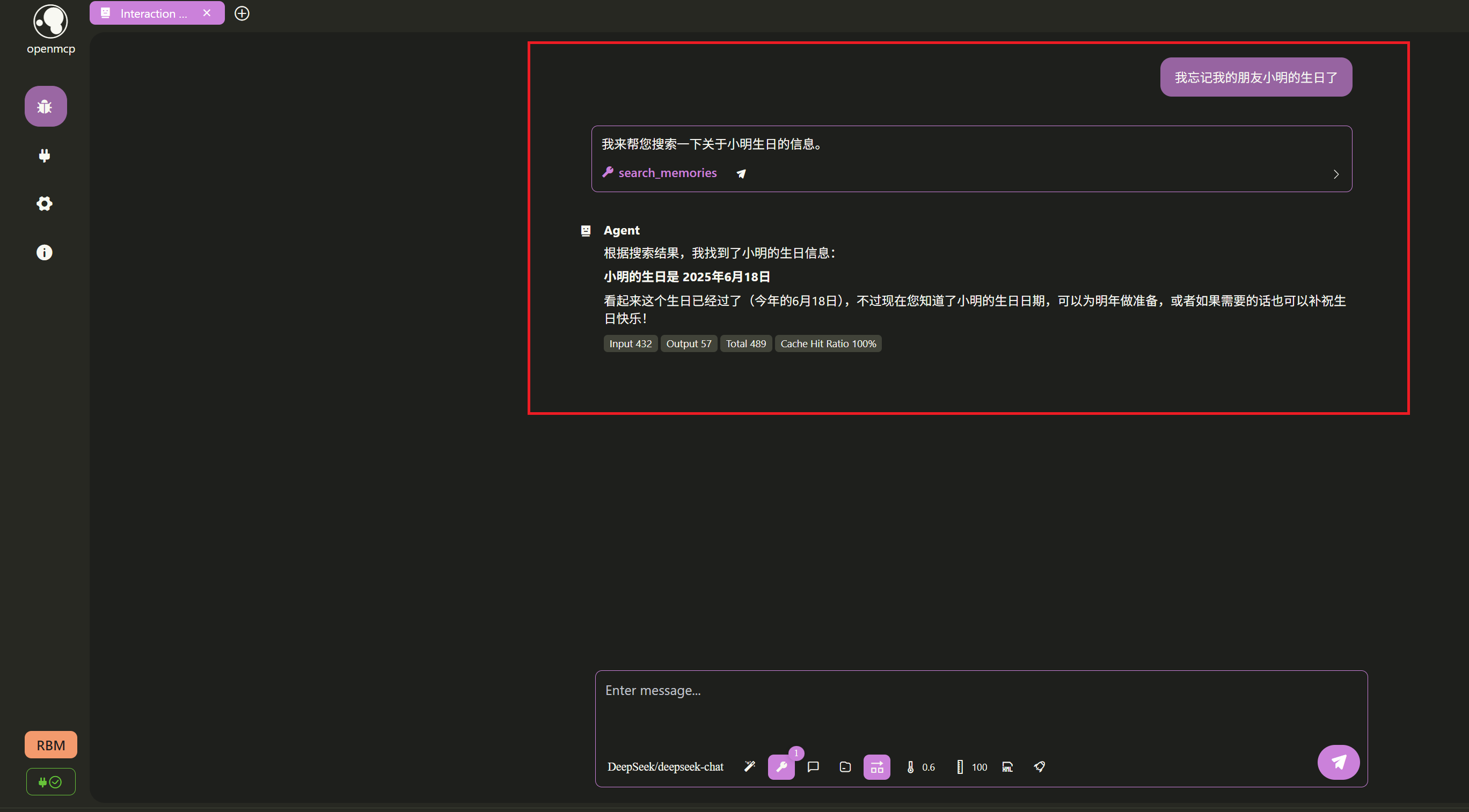# Building a RAG-Based Memory Storage MCP Server in Python
[Tutorial Code Repository](https://github.com/Dormiveglia-elf/rag_memo_mcp)
## Introduction
In this tutorial, we'll demonstrate how to build a simple RAG (Retrieval-Augmented Generation) based long-term memory storage MCP server using Python, and debug it using the [openmcp](https://github.com/LSTM-Kirigaya/openmcp-client) plugin. Once implemented, we'll be able to store, retrieve, and manage our memories through natural language interactions with large language models, without needing to write any specific query code.
## 1. Setup
The project structure is as follows:
```bash
📦rag_memo_mcp
┣ 📂memory_db/ # LanceDB database files, created during initialization
┣ 📜server.py # MCP server implementation
┣ 📜pyproject.toml # Project configuration file
┣ 📜uv.lock # uv lockfile
┗ ...
```
First, let's prepare the runtime environment. This project recommends using [uv](https://github.com/astral-sh/uv). (`uv` is a blazingly fast Python package manager that's beloved by those who use it. Of course, if you're a loyal fan of `pip` or other package managers, that works perfectly fine too.)
```bash
# First download uv (Windows)
powershell -ExecutionPolicy ByPass -c "irm https://astral.sh/uv/install.ps1 | iex"
# Or (macOS/Linux)
# curl -LsSf https://astral.sh/uv/install.sh | sh
```
```bash
# Project initialization
uv init rag_memo_mcp
cd rag_memo_mcp
# We recommend creating a virtual environment
uv venv
# Activate virtual environment (Windows)
.venv\Scripts\activate
# Or (macOS/Linux)
# source .venv/bin/activate
# Install dependencies
uv add "mcp[cli]" lancedb pandas sentence-transformers
```
## 2. Understanding the Service Implementation
Unlike traditional databases that require pre-installation and configuration, this project's core `MemoryStore` uses [LanceDB](https://lancedb.github.io/), a vector database that automatically creates and initializes itself in the `memory_db` directory when the server first starts, requiring no additional configuration.
Let's dive into `server.py` to understand its implementation details.
### 2.1 MemoryStore Core Class
The `MemoryStore` class is the heart of memory storage and retrieval functionality.
```python
class MemoryStore:
```
- **`initialize()`**: This method handles initialization. It connects to the LanceDB database (creating it if it doesn't exist), defines the memory table schema, and by default loads the `all-MiniLM-L6-v2` model for generating vector embeddings from text content.
```python
def __init__(self, db_path: str = "./memory_db"):
self.db_path = db_path
self.db = None
self.table = None
self.encoder = None
self._initialized = False
async def initialize(self):
if self._initialized:
return
self.encoder = SentenceTransformer("all-MiniLM-L6-v2")
self.db = lancedb.connect(self.db_path)
schema = pa.schema(
[
pa.field("id", pa.string()),
pa.field("content", pa.string()),
pa.field("summary", pa.string()),
pa.field("tags", pa.list_(pa.string())),
pa.field("timestamp", pa.timestamp("us")),
pa.field("category", pa.string()),
pa.field("importance", pa.int32()),
pa.field(
"vector", pa.list_(pa.float32(), 384)
),
]
)
try:
self.table = self.db.open_table("memories")
except Exception:
self.table = self.db.create_table("memories", schema=schema)
self._initialized = True
```
- **`store_memory()`**: When storing a new memory, this method generates a unique ID and timestamp for the memory content. If no summary is provided, it automatically generates a simple summary, then uses the pre-loaded model to convert the content into a vector, and finally stores all information (ID, content, summary, tags, timestamp, category, importance, vector) in the LanceDB table.
```python
async def store_memory(
self,
content: str,
summary: Optional[str] = None,
tags: Optional[List[str]] = None,
category: str = "general",
importance: int = 5,
) -> str:
await self.initialize()
memory_id = str(uuid.uuid4())
timestamp = datetime.now(timezone.utc)
if not summary:
summary = content[:100] + "..." if len(content) > 100 else content
embedding = self._generate_embedding(content)
data = [
{
"id": memory_id,
"content": content,
"summary": summary,
"tags": tags or [],
"timestamp": timestamp,
"category": category,
"importance": importance,
"vector": embedding,
}
]
self.table.add(data)
return memory_id
```
- **`search_memories()`**: This is the key to implementing RAG. When a query is made, this method converts the query text into a vector as well, then performs vector similarity search in LanceDB to find the most relevant memories. It also supports filtering by category and importance.
```python
async def search_memories(
self,
query: str,
limit: int = 10,
category: Optional[str] = None,
min_importance: Optional[int] = None,
) -> List[Dict[str, Any]]:
await self.initialize()
query_embedding = self._generate_embedding(query)
search_query = self.table.search(query_embedding)
if limit:
search_query = search_query.limit(limit)
filters = []
if category:
filters.append(f"category = '{category}'")
if min_importance is not None:
filters.append(f"importance >= {min_importance}")
if filters:
filter_str = " AND ".join(filters)
search_query = search_query.where(filter_str)
results = search_query.to_pandas()
memories = []
for _, row in results.iterrows():
memory = {
"id": row["id"],
"content": row["content"],
"summary": row["summary"],
"tags": row["tags"].tolist(),
"timestamp": row["timestamp"],
"category": row["category"],
"importance": int(row["importance"]),
"similarity_score": row.get(
"_distance", 0.0
),
}
memories.append(memory)
return memories
```
### 2.2 MCP Server and Tools
We use `FastMCP` to quickly build an MCP server and expose `MemoryStore` functionality as tools that large language models can call through the `@mcp.tool()` decorator.
- **`store_memory`**: **Take notes!** Store a memory.
- **`search_memories`**: **Let me think...** Search for relevant memories based on query content.
- **`get_memory`**: **Find by reference!** Retrieve a specific memory by ID.
- **`list_categories`**: **Organize by category!** List all memory categories.
- **`get_memory_stats`**: **Memory inventory!** Get statistics about the memory store, such as total count, counts by category, etc.
```python
# Initialize memory store
memory_store = MemoryStore()
# Create MCP server
mcp = FastMCP("RAG-based Memory MCP Server")
@mcp.tool()
async def store_memory(
content: str,
summary: Optional[str] = None,
tags: Optional[str] = None,
category: str = "general",
importance: int = 5,
) -> Dict[str, str]:
"""
Store content in memory.
Args:
content: The content to store
summary: Optional summary (auto-generated if not provided)
tags: Comma-separated tags
category: Memory category (default: general)
importance: Importance level 1-10 (default: 5)
"""
try:
# Parse tags if provided
tag_list = [tag.strip() for tag in tags.split(",")] if tags else []
memory_id = await memory_store.store_memory(
content=content,
summary=summary,
tags=tag_list,
category=category,
importance=importance,
)
return {
"status": "success",
"memory_id": memory_id,
"message": f"Memory stored successfully with ID: {memory_id}",
}
except Exception as e:
return {"status": "error", "message": f"Failed to store memory: {str(e)}"}
@mcp.tool()
async def search_memories(
query: str,
limit: int = 10,
category: Optional[str] = None,
min_importance: Optional[int] = None,
) -> Dict[str, Any]:
"""
Search stored memories using semantic similarity.
Args:
query: Search query
limit: Maximum number of results (default: 10)
category: Filter by category
min_importance: Minimum importance level
"""
try:
memories = await memory_store.search_memories(
query=query, limit=limit, category=category, min_importance=min_importance
)
return {
"status": "success",
"query": query,
"total_results": len(memories),
"memories": memories,
}
except Exception as e:
return {"status": "error", "message": f"Search failed: {str(e)}"}
@mcp.tool()
async def get_memory(memory_id: str) -> Dict[str, Any]:
"""
Retrieve a specific memory by its ID.
Args:
memory_id: The unique identifier of the memory
"""
try:
memory = await memory_store.get_memory_by_id(memory_id)
if memory:
return {"status": "success", "memory": memory}
else:
return {
"status": "error",
"message": f"Memory with ID {memory_id} not found",
}
except Exception as e:
return {"status": "error", "message": f"Failed to retrieve memory: {str(e)}"}
@mcp.tool()
async def list_categories() -> Dict[str, Any]:
try:
categories = await memory_store.list_categories()
return {"status": "success", "categories": categories}
except Exception as e:
return {"status": "error", "message": f"Failed to list categories: {str(e)}"}
@mcp.tool()
async def get_memory_stats() -> Dict[str, Any]:
try:
stats = await memory_store.get_stats()
return {"status": "success", "stats": stats}
except Exception as e:
return {"status": "error", "message": f"Failed to get stats: {str(e)}"}
```
The server startup code is at the end of `server.py`, which first initializes the `MemoryStore`, then runs the MCP server.
```python
if __name__ == "__main__":
# Initialize memory store on startup
async def init_memory():
await memory_store.initialize()
# Run initialization
asyncio.run(init_memory())
# Run MCP server
mcp.run()
```
## 3. Debugging with [openmcp](https://github.com/LSTM-Kirigaya/openmcp-client)
### 3.1 Adding Workspace Connection
Next, we'll debug using the [openmcp](https://github.com/LSTM-Kirigaya/openmcp-client) plugin. First, let's test if we can connect successfully. Here we choose `stdio`, set the working path to the project directory, then click `Connect`. In the log panel on the right, we can see that we've successfully connected.
### 3.2 Testing Tools
After successful connection, let's test if the tools work properly.
1. **Store a little secret**: Create a new `Tool` tab and select the `store_memory` tool. For example, we input:
- `content`: `Xiao Ming's birthday is 2025.6.18`
- `category`: `birthday`
- `importance`: `8`
Click `Execute`, and if successful, it will return the stored memory ID, such as `bcc30f6c-979c-46d1-b34a-cd1a09242106`
2. **Retrieve a specific memory by ID**:
After successful storage, we use the returned memory ID `bcc30f6c-979c-46d1-b34a-cd1a09242106`, select the `get_memory` tool, and test if we can retrieve it from `LanceDB`.
3. **List current memory categories**:
We call the `list_categories` tool to view all current memory categories. Since we only added one memory with the `birthday` category, the result should only contain this category.
4. **Get memory statistics**:
Next, we use the `get_memory_stats` tool to get statistical information about the memory store, such as the total number of memories and the count of memories in each category.
### 3.3 Large Language Model Interaction Testing
We intentionally "skipped" testing one tool `search_memories` above, saving it for the large language model interaction testing. Enter the interaction testing page (remember to set up the LLM's `api_key` and `base_url` first according to the [Connect to LLM tutorial](https://kirigaya.cn/openmcp/zh/plugin-tutorial/usage/connect-llm.html)). We can first disable all other tools, keeping only the `search_memories` tool:
Then, we casually ask:
Great! The large language model successfully helped me recall my friend Xiao Ming's birthday. Cheers!
